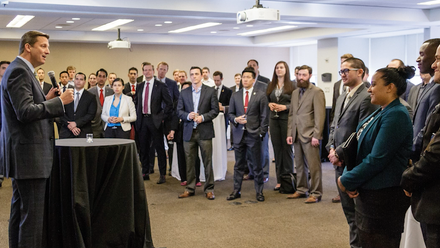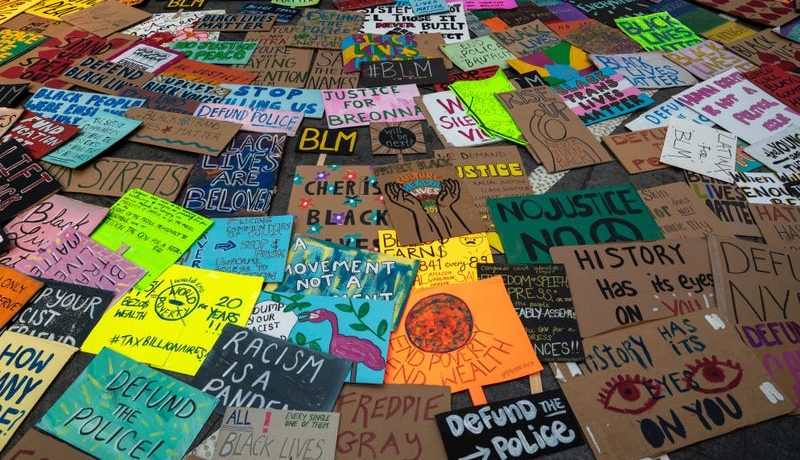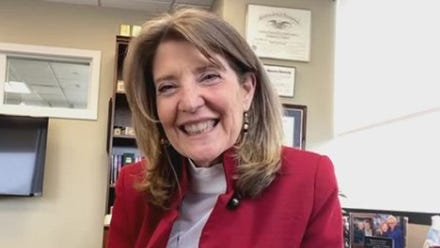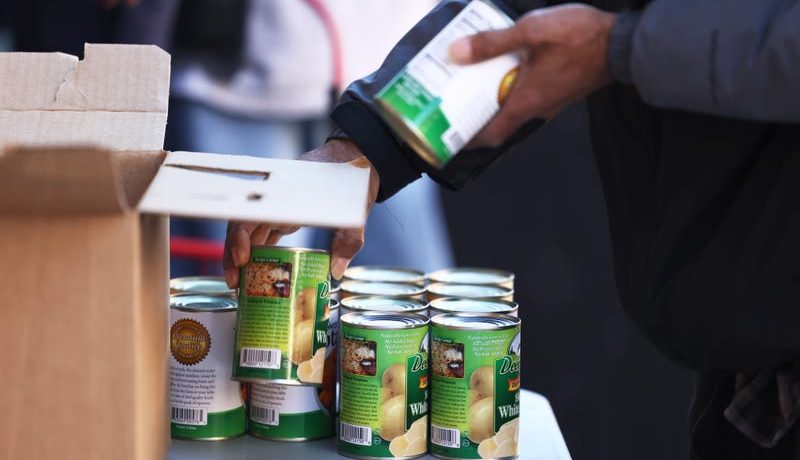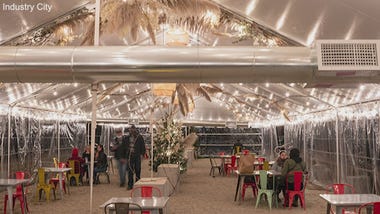
-
Veterans Organization Builds Remote Talent Pipeline to Fortune 500 companies
Post Views: 658By Neil A. Carousso
NEW YORK (WCBS 880) — The transition from the military to the workforce is often a challenge for veterans, but the pandemic has exacerbated that challenge. A non-profit organization based in Manhattan is taking up the task to virtually match vets and major U.S. companies.
“We’ve got some super smart people who enlist in the military and we wanted to create those pipelines for them to get into these Fortune 500 companies,” said Lt. Col. Michael Abrams, founder of FourBlock, who is currently serving in the United States Marine Corps Reserve.
FourBlock prides itself on preparing veterans for a career after service. The average salary for its national members is $92,811, according to the non-profit’s 2020 data.
“The companies that we work with are the ones who pay good salaries,” Abrams told WCBS 880’s Neil A. Carousso.
Since the pandemic hit, FourBlock pivoted from in-person networking events to virtual workshops and training on remote interviews.
Maxwell Acker-DeOliveira was looking for a job after recovering from COVID-19 in California where he was visiting family in May. FourBlock helped him prepare for remote job interviews with Deloitte in June – a process that happened rather quickly.
“I’m a social creature,” said Acker-DeOliveira, explaining Zoom meetings presented an obstacle for him to get over.
The Marine sergeant had been used to leading a six-man sniper team for five years. His deployment concluded in March 2018.
“You kind of have to push through that wall,” he said, adding, “You either network or you stay on the bench at Deloitte.”
Acker-DeOliveira was hired at the Big Four accounting firm within the month as a technology services optimization consultant.
Abrams said hiring managers understand they can trust veterans to take the initiative while working remotely.
“They’re not going to just sit around and wait to be told what to do,” he said, continuing, “They’re going to kind of figure out what needs to get done and get it done.”
Abrams emphasized it’s “trust and resiliency,” experience gained through their military service, that makes veterans attractive hires in the pandemic.
Watch the video above for more on this story.
-
State of Black New York: Racial Inequities in Social Justice and Civic Engagement
Post Views: 516By Lynda Lopez, Marla Diamond and Steve Burns
NEW YORK (WCBS 880) — All this month, we’ve been shining a light on the details of a report on equity and race in New York City.
The New York Urban League’s “State of Black New York” raises significant questions on issues like the economy, technology, social justice and civic engagement.
The year 2020 was one of impassioned activism for racial justice as protesters took to the streets and occupied City Hall Park following the police custody death of George Floyd in Minneapolis.
According to the New York Urban League’s report, Blacks are still over-represented in prisons due to decades of over policing and racial bias, with Black youths making up 63% of the jail population.
Bail reform was one bright spot in a difficult year, said Jullian Harris-Calvin, director of the Greater Justice New York at the Vera Institute of Justice.
“I don’t know that we ever expected that bail reform is going to fix all of the racial injustices,” Harris-Calvin said. “It has been successful in many ways, but it has not fixed all of the problems with racism and inequity in the criminal legal process.”
The Vera Institute’s recently-released Empire State of Incarceration report found jail populations fell significantly in the first half of 2020, but the racial disparities grew.
“That obviously is something that we are not happy about and it was certainly an unintended result in terms of what the data shows,” Harris-Calvin said.
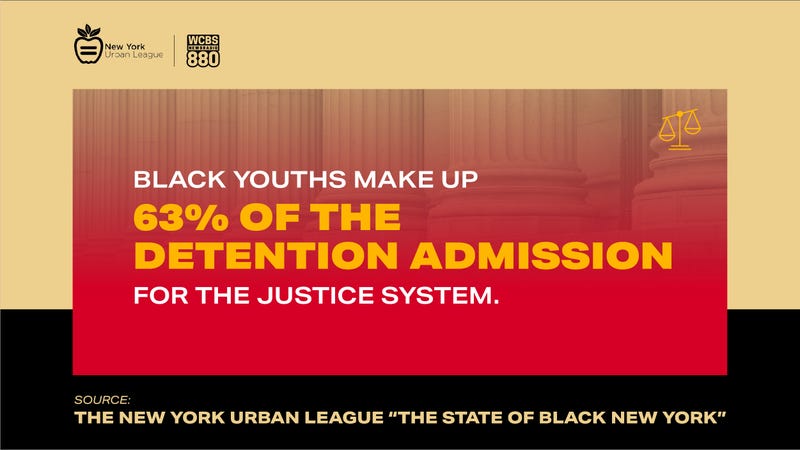
Much of the focus of criminal justice reform is on policing, the trial system and sentencing, said Alexander Horowitz, executive director of New Yorkers United for Justice.
“But where mass incarceration of Black and brown New Yorkers is most pernicious is a place where folks aren’t paying as much attention to, and that’s the back end of the system,” Horowitz said.
He tells Marla Diamond that Black and brown New Yorkers are less likely to be granted parole and when they are, they are 12 times more likely than whites to be jailed on a parole violation.
“We have to talk about who’s being granted parole, and who goes back and why, because if we continue to target Black and brown New Yorkers for reincarceration for non-criminal offenses then we are continuing this horrible legacy of the mass incarceration of Black and brown New Yorkers,” Horowitz said.
The New York Urban League’s report also tackles the question of civic engagement, which our reporter Steve Burns digs into this week.
He spoke with Chi Osse, who has gone from protester to protest leader to now City Council candidate in Brooklyn.
“It’s the craziest thing I’ve ever done in my life,” the 22-year-old said. “I realize that this is bigger than what’s happened in the summer, there’s a lot more to be done, and I’m going to be the one to do it.”
Osse was a ubiquitous sight during the protests last summer, holding court on megaphones and bullhorns across the city.
His announcement came just a few weeks later, channeling his activist energy into local politics.
“We need to bring our voice and our power to the polls,” he said.
At just 22 years old, Osse could represent the new model as we examine how to drive more widespread participation in local and national elections.
The New York Urban League reports voter turnout among African Americans has been trending downward and communities of color were more at risk of being undercounted in the census.
New York’s arcane voting laws also don’t help matters.
“Many New Yorkers would be surprised to know that some states all over the country and even in the south have some more progressive legislation on this front than we have,” said New York State Sen. Zellnor Myrie.
Myrie told WCBS 880 last month that it’s been his mission to take New York from worst to first as chair of the elections committee.
“We think more democracy is better,” Myrie said.
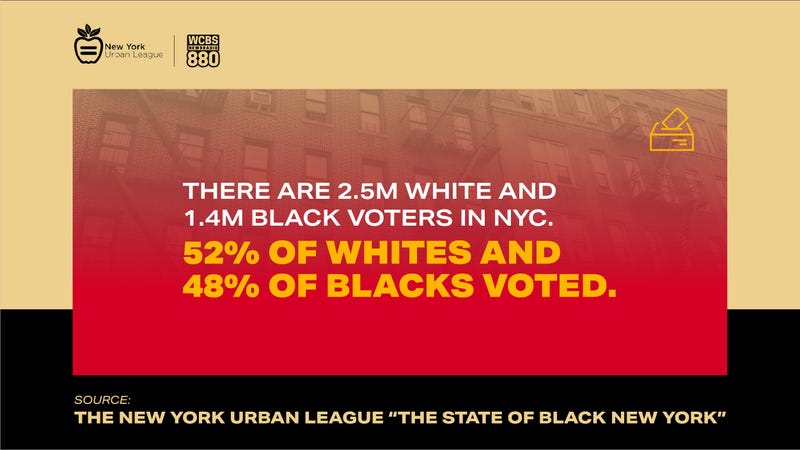
After a test run in 2020, lawmakers are now looking into allowing absentee or mail-in voting without needing a pre-approved excuse first.
“We almost have a culture of absentee voting now, something that very few voters utilized in the past has become one of the main ways that voters have partaken in their democracy,” Myrie said.
New York also enjoyed its first election season with early voting, opening the polls 10 days ahead of Election Day. This year marks the first test for another innovation in the city.
“Ranked choice voting is the process that is going to be used going forward in New York City local primary and special elections,” said Sean Dugar, who is in charge of education and outreach for Rank the Vote NYC.
He tells Burns that giving voters the option to rank their top five candidates instead of just one opens all kinds of civic doors.
“Ranked choice voting forces candidates to no longer talk to a small block of voters in hopes of getting elected, they have to talk to every voter in a district or in a city in order to get not just first choice votes, but second, third, fourth and fifth choice votes which may put them over the top,” Dugar said.
He believes the system levels the playing field and forces candidates to focus on policy rather than personality.
But it hasn’t been without controversy. Members of the City Council’s Black, Latino and Asian Caucus sued in an attempt to stop ranked choice voting this year claiming the outreach hasn’t been there for communities of color.
Dugar disagrees saying, “We’ve done trainings for community groups, we’ve had elected officials host public training, we’ve had the candidates themselves host public training.”
That injunction was struck down, but those council members are appealing.
On a foundational level, Osse said civics education has been lacking.
“I think we need to start educating the youth about not only how to vote and who your electives are, but also how to run,” Osse said, adding that he hopes to be a trailblazer for others, especially those who might not fit the traditional mold of a politician. “This is such a cliché, but be yourself and speak your truth.”
And to do that, there’s no better time than the present.
“If you have a vision and a voice and you have distaste for what’s happening in your neighborhood, or something next door, on your block, speak up about it and maybe there’s someone else that feels that same way about that issue,” Osse said.
As we end the month looking at the issues of race and equity in our community, we wanted to bring in another one of the candidates for mayor of New York City on the topic.
WCBS 880’s Lynda Lopez spoke to Brooklyn Borough President Eric Adams about the racial divide in our community and what he believe we need to do about it.
Lopez started the conversation by discussing civic engagement.
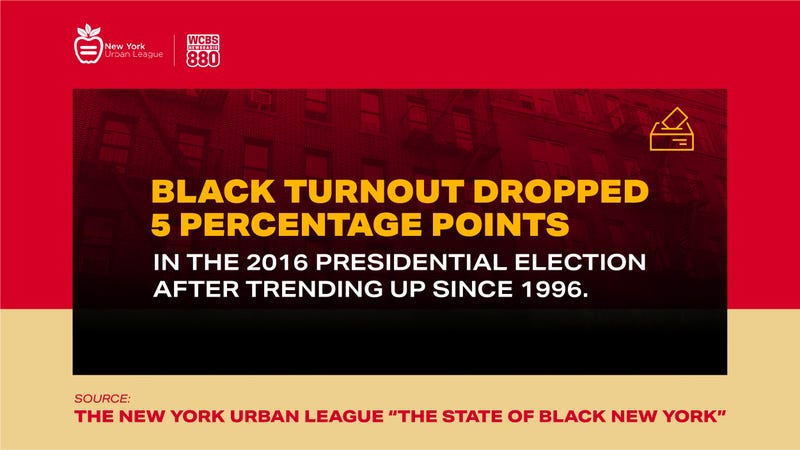
On a national level, there was an increase in engagement among Black voters from 1996 to 2016, and then it plummeted that year. In New York, we have our own voter patterns and issues.
Asked about the challenges in getting communities of color engaged in voting, particularly in a mayoral race, Adams said, “First we have to stop believing that engagement is something you could do in a spot way based on the campaigns that are taking place. It must be built into our school system, we must have an aggressive engagement plan while young people can see and understand how resources for their schools equate into who they elect and how they involve themselves civically, and allow them to volunteer and intern in governmental offices.”
He believes it should be part of the overall requirement in schools to understand local government.
Secondly, Adams said we need to speak with local stakeholders.
“We failed to do that and engage people in a language and the cultural norms that they will understand,” Adams said. “Those are two important areas that we can make real changes.”
Campaigning in the middle of a pandemic poses its own challenges, but Adams said he is continuing to engage voters on the ground.
“We have to give out literature to talk about our campaign, I’m still doing that, but this time I’m wrapping it in face masks and I’m giving instructions on how to avoid COVID-19. We’re standing at food pantries and giving out food and talking to people as we hand out food, not to politic, but just to let them know the consistency of delivering service to every day New Yorkers,” Adams said. “And really informing New Yorkers about those benefits that are available to them.”
Lopez also asked Adams about the social and criminal justice statistics laid out in the New York Urban League’s report, which showed that by 1992, Blacks and Latinos made up 92% of the New York state prison population.
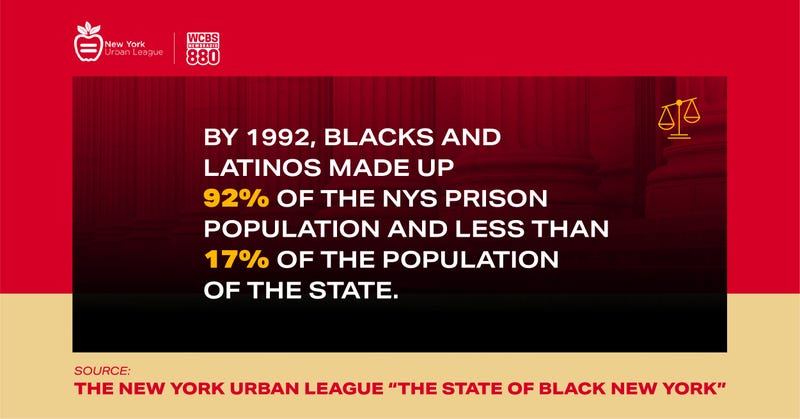
Adams, a former police officer, has more experience in policing in the city than his opponents. Other than the changes implemented in the wake of the summer’s protest, Lopez asked him what the city is now not doing to address the problem head on.
“We have to address the problem on three levels. Number one, real crime that takes place in this city happens in our school system. If you don’t educate, you will incarcerate. You have a failing school system, where 65% of Black students don’t meet proficiency. So if you go to Rikers Island and look at the numbers presumably 30% are dyslexic, 80% don’t have their high school diploma or equivalency diploma, 55% have learning disabilities and so really RIkers Island is a reflection of a failed educational system,” Adam said. “We need to go long term by improving our educational system and then we could do short term things such as foster care.”
He said hundreds of young people age out of foster care at 21 and only 12% will graduate for high school, 3% will enroll in college, and are more likely to be victims of crime or participate in crime.
“If we invest only $50 million a year and allow them to age out at 26 they are more likely to be productive citizens, not involve themselves in criminal justice behavior and really live a productive life,” Adams said. “We have to move from a reactive law enforcement plan to a proactive law enforcement plan and prevent crimes.”
Speaking to education, Adams said closing the digital divide is crucial to solving racial inequities.
“We need to engage into a real conversation about how the city gets involved in ensuring high-speed broadband. We can no longer leave it up to the private companies and entities. High speed broadband and access to internet is no longer a luxury, it is a necessity,” Adams said.
Adams said the people of New York City are not getting their money’s worth and he’s most focused on addressing those failures in his bid for mayor.
“They’re doing their job as taxpayers and they’re paying their taxes, government is not doing its job. Our city is dysfunctional and the dysfunctionality is in our agencies and those inefficiencies in our agencies, they’re leading to the inequalities and in many cases the injustices,” Adams said. “That’s why we see the continuation of Black, Brown, immigrant and poor people are constantly staying in systemic poverty and the goal is to get taxpayers’ dollars operating correctly and we do that by having our city and our agencies become more efficient and that’s what the next mayor must do. We can’t continue business as usual in a city that has had the business of locking out too many New Yorkers.”
Adams said he would be a “blue collar mayor” in the spirit of Fiorello LaGuardia. He believes that his life experience of growing up in poverty, working as a dishwasher and living on the verge of homelessness will help him lead the city because he is in a better position to understand what every day New Yorkers are going through.
“I think the next mayor must be a mayor that has gone through a lot so they could help people who are going through a lot,” Adams said. “It’s time for an everyday New Yorker that understands New Yorkers to help us get out of COVID-19.”
https://omny.fm/shows/880-weekly-rewind/the-j-j-vaccine-legal-weed-and-wrapping-up-racialNeil A. Carousso produces The 880 Weekly Rewind with Lynda Lopez Friday nights at 7 PM on WCBS Newsradio 880. Listen to this week’s full show on the media player above.
-
Small Business Spotlight: Cindi Bigelow Shares Tips for Surging Online Sales as Retail Remains Sluggish
Post Views: 676By Joe Connolly and Neil A. Carousso
NEW YORK (WCBS 880) — It’s no surprise online sales have surpassed retail sales given pandemic restrictions, but Bigelow Tea’s third-generation president and CEO Cindi Bigelow understands exactly how to grow her fan base.
“It’s very important that you build out each page for each product with as much as you can both from a visual perspective and a verbal perspective so that you have to make that product come alive,” said Bigelow on the WCBS Small Business Spotlight, sponsored by Dime Community Bank.
She calls this the “digital shelf,” likening it to a store shelf that should capture shoppers’ attention ideally at eye level.
“We have a team of individuals that literally work on the different places that we are on the web to examine every single page to make sure that page is maximized,” Bigelow said.
She told Joe Connolly and Neil A. Carousso her world famous Bigelow Tea is very much in demand with online sales of some teas surging beyond 100 percent. But, the overall business is only up 6 percent while retail, restaurants, offices and universities are closed or limited 11 months after COVID-19 shut down large swaths of the U.S. economy.
“That’s a high hurdle to get over,” she said.
Bigelow’s manufacturing plant based in Fairfield, CT. She employs 400 workers at her family business with 300 employees in manufacturing who are required to be on-site with safety precautions in place. She expressed concern on WCBS 880 about small businesses that do not have the resources to invest in digital infrastructure.
“What about Main Street?” Bigelow asked with excitement, continuing, “Don’t you want your child to be able to work at the pizza shop down the street during their summers and being able to work at a shoe store?”
She explained she is sensitive to how local businesses have been stifled by the deadly virus and the lack of government relief, noting it could impact generations to come.
Those that are in operation, Bigelow said, need to pay close attention to consumer behavior and changing trends.
“We will listen to absolutely everybody,” she said, using a customer complaint about the lack of “peachiness” in one of her teas as an example. She noted that’s how they “identify what to do better.”
Bigelow’s motto is “the meanest taste bud wins,” meaning she will listen closely to those who offer criticisms to improve her products, which have been on store shelves for 75 years.
That’s one way she limits the echo chamber of “yes men” around her and a way to anticipate changing consumer preferences she applies to tea, but can apply to any industry.
See Joe Connolly and Neil A. Carousso’s conversation with Cindi Bigelow of Bigelow Tea on the WCBS Small Business Spotlight video above.
-
State of Black New York: Income Inequality and Race
Post Views: 841By Lynda Lopez, Marla Diamond and Mack Rosenberg, WCBS Newsradio 880
NEW YORK (WCBS 880) — We at WCBS 880 and Entercom New York are pleased to partner with the New York Urban League to shine a spotlight on issues of inequity in our community in important areas like health care, education, the digital divide, social justice, the economy, and civic engagement.
Last week, we looked into the racial inequities in health care and education.
As we dig into a comprehensive report released by the New York Urban League titled, “The State of Black New York,” we take a deeper dive into the issues of income inequality and race.
https://omny.fm/shows/880-weekly-rewind/special-report-the-state-of-black-new-york-1As the old saying goes, “If you could make it here, you could make it anywhere,” but according to the Robin Hood & Columbia University’s Poverty Tracker, a majority of Black New Yorkers are barely making it.
The tracker found 59% have lived in poverty for at least one of the past four years and 35% of adult New Yorkers who exit poverty fall back in the following year.
Almost 50% of New Yorkers of color lack sufficient income to meet basic family needs.

Dr. Melony Samuels, of the Beford-Stuyvesant-based food pantry Campaign to Fight Hunger in New York City, sees it every day firsthand.
“We have seen an increase of 1020%. Right now we are distributing food to 14,000 families per week, which is beyond the thoughts of what we could ever think,” Samuels said. “We’re seeing that families are in dire need for food. It has been very, very scary.”
Samuels said in the last survey they conducted, 75% of those that have come for food are there because of unemployment.
The New York Urban League found half of the city’s job growth since 2010 has been in industries with average annual wages under $40,000.
“Sixty-one percent of those we serve do have a job, but they struggle in order to put food on the table, and for obvious reasons. The rents are very high in New York City,” Samuels said.
Before the pandemic, gains were being made in the city’s communities of color, said Noreen Springstead, executive director of WhyHunger.
“The hunger numbers were actually moving down, we were making a lot of progress. As soon as the pandemic hit, they skyrocketed. I think most people have seen those long lines of people in need, really human suffering, looking for food to feed themselves and their families. So it’s not a new problem, however, it has been exacerbated by the pandemic,” Springstead said. “We have skyrocketing hunger. It is the ripple effect and it’s going to take a long time to recover from this hunger crisis.”
Fifty-four million Americans do not have enough food. The undocumented cannot qualify for SNAP benefits to feed themselves or their children.
“The COVID pandemic has really pulled the covers back on what has been true for a very long time — that communities of color suffer at disproportionate rates of health crises, food crises, housing crises, and what it does is creates an opportunity to begin to address those issues much more holistically,” said Sprinstead.
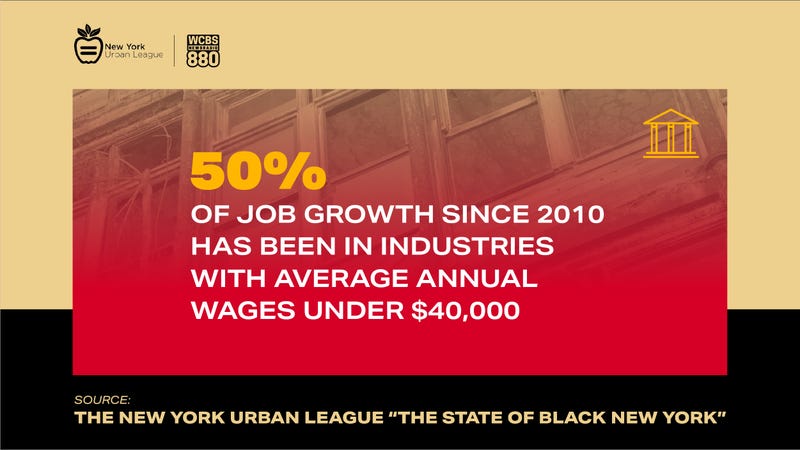
As part of our coverage of this topic, we wanted to engage some of the people running for mayor of New York City to discuss the problems and potential solutions.
Democratic candidate Kathryn Garcia has been in city government for 15 years working in housing, environmental protection and sanitation. Most recently, she worked as the city’s food czar during the early days of the pandemic and saw firsthand the need.
“I think that this is really a tragedy to see these types of numbers, but know that there’s a human face behind them and a human family, usually with kids. And there’s a lot the city can do. Not only does the city need to ensure that we’re supporting people through the safety net programs that we have, but also creating real opportunity for people across the city and particularly for Black people and for women who have shouldered the burden so often in this city and we’re not creating jobs for them,” Garcia said. “That is why I would pair the concept of economic development with workforce development and ensure that those two things go hand in hand.”
Garcia said the city must also guarantee that high-paying jobs are available for students coming out of CUNY.
Garcia is also focused on making the city more affordable.
“First and foremost, when we talk about housing we have to make sure that we are renovating all of the NYCHA apartments and making them high quality places for people to live and raise their families,” Garcia said. “We also need to continue building and build deeply affordable housing for those who are at the lowest incomes levels, but also just make it easier to build housing. We’ve been in a scarcity situation since before I was born.”
Garcia said housing heals.
“We know the virus went rampant in overcrowded housing and got many more people sick because they couldn’t quarantine from each other, we know that it means that you can be much more successful in school, and we know that it’s easier to hold down a job when you have a permanent home,” Garcia said.
Meanwhile, just this week, Mayor Bill de Blasio announced plans to help close the wealth gap in New York City with a program to encourage people to shop at and celebrate Black-owned businesses.
There is no question that COVID-19 has wreaked havoc on local businesses, but studies show that Black businesses are twice as likely to shut down during the pandemic.
There are twice as many white entrepreneurs as Black ones in the city, according to the New York Urban League, and the Black-owned businesses that do exist make up just 2% of the total, and even less than 2% of the employees are Black.
The biggest challenge for Blacks in getting their foot in the door is money. Stats show banks won’t give it to Black as much as they will to whites.
Dawn Kelly, owner of a popular juice bar in Jamaica, Queens, was well aware of those realities when she lost her job in public relations at Prudential a few years ago.
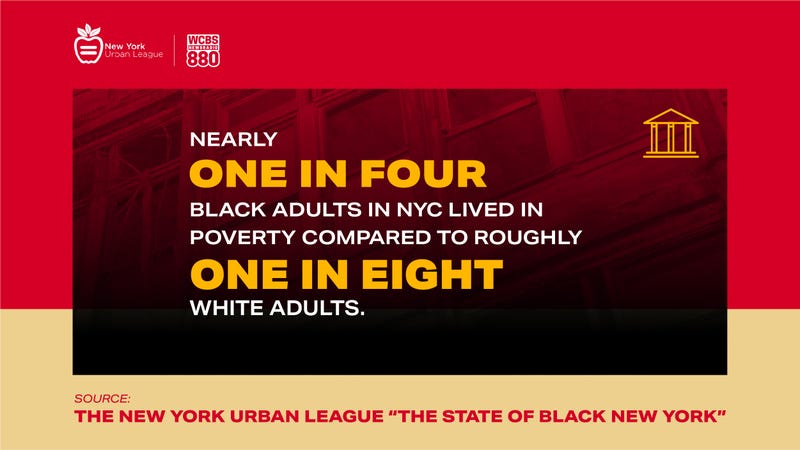
Our Mack Rosenberg asked her whether she thinks she would’ve been able to start her business if she didn’t get a severance package and had to rely on a loan.
“I would tell you that I think it would’ve been challenging and difficult at best,” she said. “The stories are out there. Black people, for the most part, and first time business owners, so I don’t want to just say Black people, but Black people more often than not don’t get the capital from the banks and lending institutions that they need in order to start a business and to sustain a business.”
Aside from her success since opening The Nourish Spot is her success as a mentor to young Black people looking to become entrepreneurs.
Also in on the mission to expand the Black economy is the city’s Small Business Commissioner Jonnel Doris. He started BE NYC, with “BE” standing for Black Entrepreneurs. With funding from the city and big companies like Ernst & Young and Mastercard.
They operate on what Doris likes to call the three M’s — money, mentorship and marketing.
“Help you with access to capital by bringing in new partners like Goldman Sachs and others, making sure that they’re connected to other peers that can help them sort of get through the program, and how do we expand and grow to digital storefronts but also enhance your online presence being that we’re in the pandemic most of what we’re doing online,” Doris said.
He calls Kelly a star, in large part because of her mentoring.
Three young Black people have already started their own businesses thanks to her.
“Because I know more, I must do more. There’s a famous saying in the Black community, ‘To whom much is given, much is required.’ And so I see my life, not really differently than others, I just have made different choices than others, and so because I have had the opportunity to do more, see more, experience more, I see it as my role to teach others,” Kelly said.
Doris said it’s critical for entrepreneurs to help other entrepreneurs like Kelly is doing. But he still sees the financial challenges as a stumbling block.
“These things are critical. What others don’t have to think about when they start a business, the businesses that we’re talking about here today do,” Doris said.
As we round out this week’s reporting on the New York Urban League report on the “State of Black New York,” we wanted to bring in another candidate for mayor.
Ray McGuire has spent his career on Wall Street helping run big companies, including Morgan Stanley and Citi Group.
His is African American and self-made.
Our Lynda Lopez spoke to him this week about his thoughts about the racial divide in the economy.
He said his plan is to lead the largest most inclusive economic comeback in the history of this city.
“Which is to put people to work, give people jobs, move them from no class to middle class,” McGuire said. “My plan is go big, go small, go forward, putting 500,000 New Yorkers to work so that they can earn a wage, earn a living, that takes them from the lower income to the middle income so they can participate in the way that all of us want to participate in this city.”
At the center of his plan, is a focus on infrastructure that includes affordable housing.
“It should not be the case that people make $15,000 to $30,000 a year, who are really essential to how this city works, pay 50% to 60% of their income to rent. That’s not truly affordable, so we need to make certain that we build truly affordable houses,” McGuire said, adding that the digital divide is also an issue he plans to address. “It’s had such a negative impact and profound impact on how we educate our kids and what my plan is, my go big plan, is to focus on building broadband so that people have access. We have 1.5 million New Yorkers, people who are lower income, don’t have access to broadband or mobile and we need to fix that.”
His plan also focuses on small business that he describes as the lifeblood of the communities.
“I have a plan to support the small business with wage concessions, 50% wages, so they can keep their sales tax receipts, so that we cut the bureaucracy and give them relief on many of the fines that have been levied,” McGuire said.
His goal is to uplift the city economically and grow out of this crisis.
https://omny.fm/shows/880-weekly-rewind/cuomos-nursing-home-problem-vaccines-and-texas-powNeil A. Carousso produces The 880 Weekly Rewind with Lynda Lopez Friday nights at 7 PM on WCBS Newsradio 880, including all video content. Listen to this week’s full show on the media player above.
-
Small Business Spotlight: Industry City Draws Scores of Weekend Shoppers, Positions Retail ‘Partners’ to Succeed
Post Views: 552By Joe Connolly and Neil A. Carousso
NEW YORK (WCBS 880) — Industry City has developed the holy grail of retailing by attracting 10,000 visitors each weekend – 75 percent of pre-pandemic volume – while investing in its tenants’ recovery.
The historic complex bills itself as “Brooklyn’s vibrant creative hub along the scenic waterfront of Sunset Park,” housing 550 local shops, restaurants and manufacturers – many of which have suffered steep losses. But, Industry City’s largely open-air space has allowed them to operate safely. About 40 percent of its tenants have reopened since the shutdown.
“They can safely come, hang out, have a drink, see some music, shop at Sahadi’s, shop at Japan Village, etc. and that’s really helped them considering the environment,” Industry City Director of Development Jim Somoza said on the WCBS Small Business Spotlight, sponsored by Dime Community Bank.
The complex owns its own streets and has sprawling outdoor dining space with large tents for inclement weather.
Somoza was part of the development team of Chelsea Market, starting in 2003, before embarking on Industry City’s vision of new-age retail-tainment featuring innovative local businesses that appeal to Brooklynites and tourists alike.
He told Joe Connolly and Neil A. Carousso about several Industry City tenants, including a blacksmith that entices customers to the waterfront space.
“While they’re coming to see that, they’re also buying a drink at the Frying Pan, they are going to Standard Wormwood and Brooklyn Kura,” Somoza said, adding, “They bring people to the overall project.”
Industry City’s business plan revolves around the experience, which he describes as the “antidote to the Internet.” People are itching for an outlet and Somoza anticipates high post-pandemic demand.
“When we are doing our jobs well at I.C., we’re transporting people,” he said. “We’re taking you away.”
Shoppers can take blacksmith classes at Nazz Forge, savor chocolate as they watch it being made at Li-Lac Chocolates, and watch the Christophe Pourny Studio restore antique furniture on the other side of the glass. This connects consumers and producers on another level through an Epcot-like or Hershey Park adventure in Sunset Park, Brooklyn.
It could be the model for business communities who will need to convince hardened online shoppers to shop local and in-person.
Businesses in Industry City have been set up to recover and succeed. Somoza told WCBS 880 he likes to think of their role as a “partner” to its tenants rather than a “landlord” – a word he avoids using.
“What we do is we support them,” he explained.
At the outset of the coronavirus pandemic, Industry City offered rent breaks, changed leases to percentage rent, and helped business owners navigate the Paycheck Protection Program (PPP) loan applications and requirements.
“I think that’s a part of the reason, with one exception, every single one of our retailers has reopened,” said Somoza.
Small and mid-size businesses there feel they are nearing the finish line at the end of an arduous year, according to Somoza, who noted many are applying for the latest round of the PPP loan.
See keys for creating economic development to recover from the pandemic on the WCBS Small Business Spotlight video above.
Interview
Social Feeds

VIDEO: Told the airline to book us on the next flight out (SPONTANEOUS TRIP!)

VIDEO: The Taylor Swift Effect | WCBS Business Breakfast

VIDEO: Future of NYC | WCBS Business Breakfast

VIDEO: Reasons for New Yorkers to be Optimistic | WCBS Business Breakfast

VIDEO: NYC's AI Chatbot | WCBS Business Breakfast


